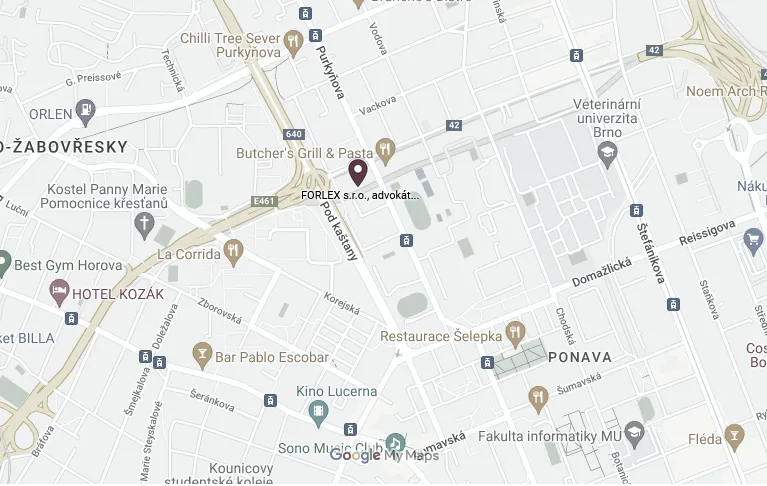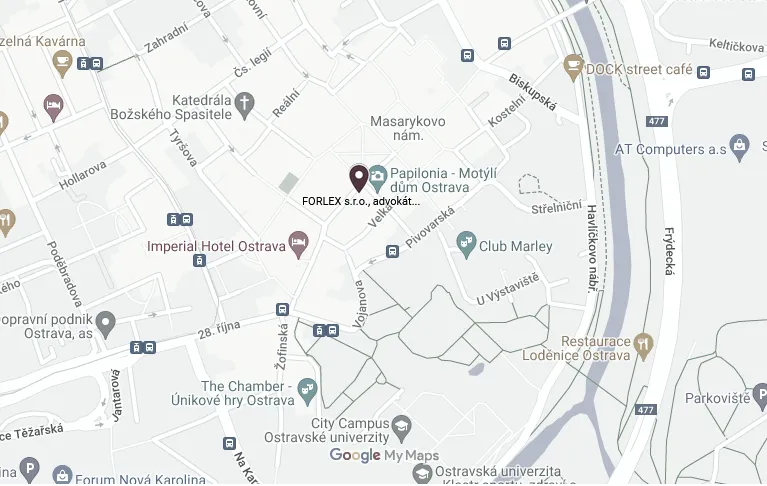NEWS
27/4/2020
CORONAVIRUS UPDATE – LEX COVID
On 24 April 2020 an act on certain measures to mitigate the effects of the coronavirus epidemic (Lex COVID) on:
• persons involved in the court proceedings
• damaged and victims of crimes
• legal entities
• execution and enforcement
• amendment to the Insolvency Act and the Code of the Civile Procedure
• and contractual default interests
came into force.
INSOLVENCY LAW
• Legal entities and natural persons engaged in business shall not be obliged in the period from the entry into force of Lex COVID until 6 months from termination of the extraordinary measures (until 31 December 2020 at the latest) to file an insolvency petition (as a debtor) which would otherwise be required to be filed after they learned or should and could have learned about their bankruptcy – this does not apply if the insolvency already occurred before the extraordinary measures was addopted or was not caused mainly in connection with the extraordinary measures
• Insolvency petitions submitted by creditors in the period from the entry into force of Lex COVID until 31 August 2020 shall not be taken into account
• Debtors shall have the opportunity to propose an extraordinary moratorium (the Act extends the scope of the application of moratorium based on defaults due to the extraordinary measures during epidemic) or exemption from payment of debts included in debt relief
Extraordinary moratorium
• May also be proposed even before the insolvency proceedings initiation; after the initiation of the proceedings (initiated on the basis of petition filed by other person) within 15 days from a delivery of the insolvency petition to the debtor by the court
• for a period of time up to 3 months (may be prolonged by up to 3 months if the majority of creditors agreed so)
• no decision on insolvency can be issued during moratiorium
• debtor is entitled to pay the liabilities directly related to the maintenance of the operation of the business arising after the announcement of the moratorium for its duration in preference to previously due liabilities
• a contract for supply of energy, raw materials, goods and services lasting at least for 3 months as of the date of the announcement of the moratorium cannot in general be unilaterally terminated by a counterparty for the debtor’s default of payment for supplies, a counterparty is not entitled to refuse performance as well
EXECUTION AND ENFORCEMENT LAW
• Execution by sale of movables assets shall not be carried out until 30 June 2020 unless a debtor announces in writing that the execution is to be continued by sale of movable assets or it is a recovery of a maintenance claim, compensation for damage caused by personal injury or intentional crime
• Execution by sale of immovable assets in which debtor has their place of permanent residence shall not be carried out until 30 June 2020
• In the period from the entry into force of the act until 31 December 2020, the blocking of bank accounts shall not apply to an amount up to four times the subsistence level of an individual
CONTRACTUAL DEFAULT INTERESTS
• If a debtor proves that the restrictions resulting from the extraordinary measures during epidemic made it impossible or significantly difficult for them to repay the monetary debt on time, the debtor may be required to pay defult interest only up to the statutory amount for the duration of the measures. These effects shall cease no later than 30 June 2020. The diverging arrangements shall not be taken into account.
This restriction only applies to defaults occurred since 12 March 2020. Also, the restriction does not apply to obligations under contracts concluded after the entry into force of Lex COVID.
PERSONS INVOLVED IN THE COURT PROCEEDINGS, DAMAGED AND VICTIMS OF CRIMES
Pursuant to the act it shall be possible to apply for a remission of non-observance (or re-establishment of the time period), namely in:
• civil proceedings
• administrative court proceedings
Please note the possibility to apply for a remission does not apply to proceedings under the Administrative Procedure Code – i.e. for example construction proceedings, proceedings before the ERÚ or infrigement proceedings.
• Execution and enforcement proceedings
• Insolvency proceedings
• proceedings before the Constitutional Court
• criminal proceedings and proceedings on the satisfaction of a property claim pursuant to the Act on the use of funds from property criminal sanctions imposed in criminal proceedings
• proceedings on request for a financial assistance under the Act on victims of crimes.
The condition is that the time limit has not been met for an excusable reason consisting in the extraordinary measures during the epidemic which made it impossible or significantly difficult to take action.
Please note:
- it is not a general extension of time period or remission of non-observance;
- it shall be always necessary to apply for remission of non-observence with respect to the time period in question
- and prove
a) excusable reason
and at the same time
b) the fact the reason was caused by the extraordinary measures, i.e. the mere existence of the extraordinary measures is not the excusable reason.
However, we believe that, given the very broad and vague definition of the relationship between the reason and its cause, it can be expected the courts shall generally grant the requests, in particular because such a decision is not needed to be fully reasoned by the court and the granting decision cannot be appealed.
Legal services in CZ, SK and abroad
Contact

info@forlex.cz
+420 596 110 300
Ostrava
FORLEX s.r.o., attorneys-at-law
28. října 3159/29, 702 00 Ostrava
Brno
FORLEX s.r.o., attorneys-at-law
Jana Babáka 2733/11, Královo Pole, 612 00 Brno
Billing information
IČO: 04275705, DIČ: CZ 04275705
ČSOB
Account No. CZK – 321695472/0300
Account No. EUR – 333568649/0300
Registred in the Commercial Register maintained by the Regional Court in Ostrava, Section C, File 63028.
Consumer protection information
On 5 February 2016, the Czech Bar Association was authorized by the Ministry of Industry and Trade of the Czech Republic to deal with alternative consumer dispute resolutions in the field of disputes between a lawyer and a consumer arising from legal service agreements (under Act no. 634/1992 Sb., on consumer protection, as amended). The website of the designated body is www.cak.cz.



